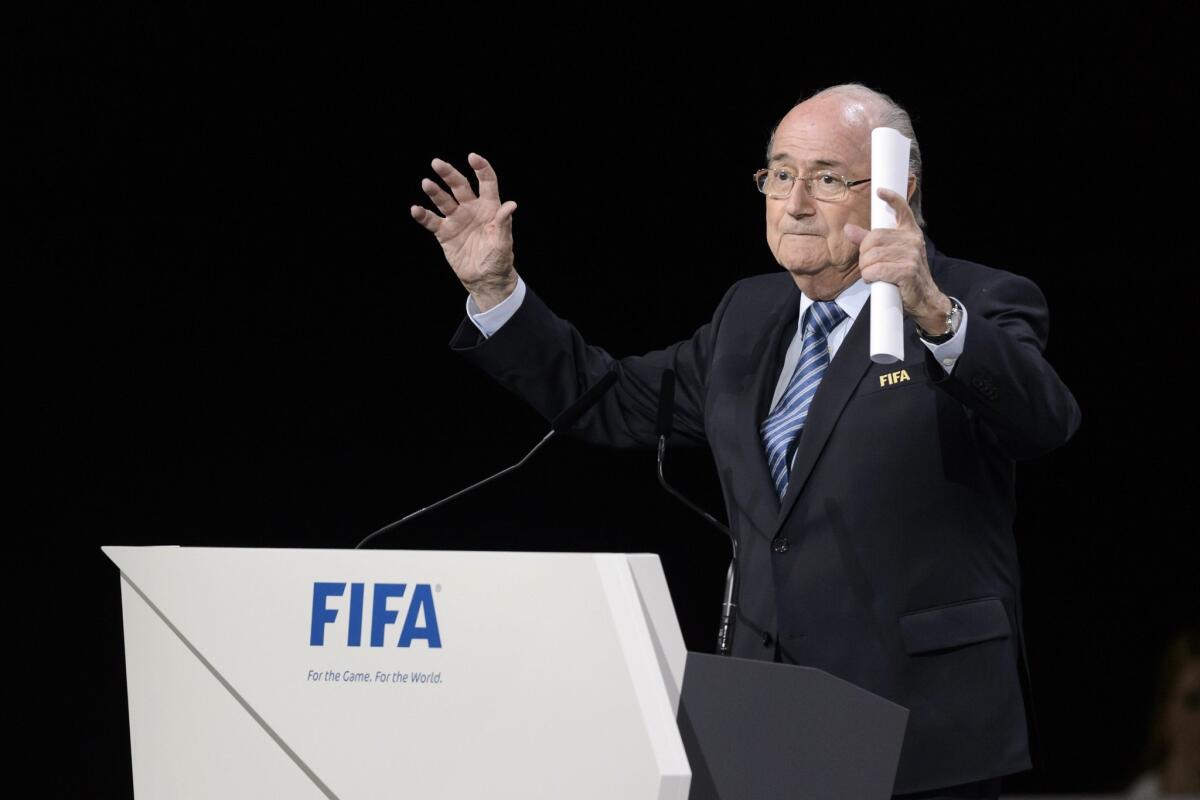Opinion: Blatter quitting FIFA doesn’t necessarily mean change is afoot

In the end, the emperor self-deposed.
Sepp Blatter’s announcement Tuesday that he would step down as the president of FIFA, world soccer’s scandal-racked governing body, is as welcome as it is tardy. Blatter was reelected to his fifth four-year term as president Friday, just two days after top FIFA officials were trundled off in handcuffs following their indictments on racketeering charges. The election result was just as skewed as the votes awarding World Cup tournaments to Russia in 2018 and four years later to Qatar – a tiny nation with a tiny soccer presence, no sports infrastructure, and 115-degree heat for a tournament to be played outdoors.
Not that Blatter’s reelection was rigged, but the power and politics of FIFA make Washington influence-peddling and old-style political machines seem like amateur hour (Bloomberg dissects it nicely here).
Blatter has not been accused of direct involvement in the bribery scandal that is unfolding in New York, which is where the indictments were issued. But reports surfaced Monday that a $10-million suspected bribe passed through Blatter’s top aide, and Blatter has spent the last 17 years running an organization in which bribery and self-dealing have led to scandal after scandal. The corruption is so entrenched that FIFA whitewashed then shelved an internal report by its own chief ethics investigator, Michael J. Garcia, a former U.S. attorney in New York.
The Times’ editorial board last week urged FIFA’s 209 member nations to oust Blatter, which they failed to do. The board also urged the federal government to push the investigation as far as the evidence leads “to root out the corruption and catalyze a cultural change within FIFA.”
“And that change should start at the top. FIFA President Joseph ‘Sepp’ Blatter, under whose watch this corruption has flourished, is seeking a fifth four-year term as FIFA’s president in a vote Friday in Zurich. FIFA’s 209 member nations could begin restoring credibility by ousting him in favor of reform-minded challenger Prince Ali Bin Al-Hussein of Jordan, and by changing the organization’s rules so that the world can learn the details of Garcia’s investigation,” the editorial board wrote.
Of course, with such rampant corruption in the organization, Blatter’s resignation and call for a special vote on his successor doesn’t mean change is imminent. And even if this is the start of a revolution within FIFA, it will come too late for the hundreds of foreign laborers who have died in Qatar, and the thousands more living and working in deplorable conditions (some as forced labor), to create the fields on which the “beautiful game” is to be played.
But let’s hope it’s a meaningful start.
Follow Scott Martelle on Twitter @smartelle.
More to Read
A cure for the common opinion
Get thought-provoking perspectives with our weekly newsletter.
You may occasionally receive promotional content from the Los Angeles Times.











